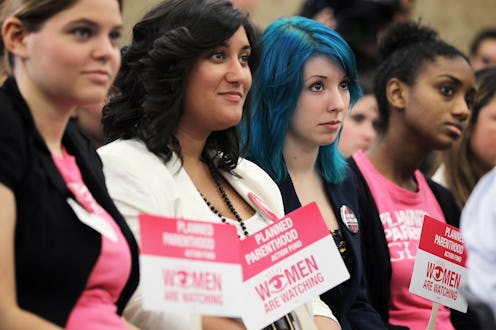News
The AHCA Would Be A Bad Turn Of Events For Women

If you lived through the health care reform legislative fight of 2009, through which President Obama's Affordable Care Act was ultimately signed into law, you might be surprised at just how fast things are moving. Back then, Republicans bemoaned the year-long legislative process as too sudden, and as having a major bill "jammed down our throats." But with a House vote scheduled this week, less than a month since the bill was unveiled, it seems its now the GOP doing the jamming. And it could have dire implications. In particular, the AHCA bill will be horrible for women's health, increasing financial burdens and restrictions on their access to care.
For starters, the bill would defund Planned Parenthood, which would have a deleterious effect on women's health, whether you're talking about availability of abortion services or the millions upon millions of women who seek other forms of medical care, like contraception or cancer screenings, from the organization. It's true both that abortion is a constitutional right in the United States under the Supreme Court's Roe v. Wade ruling and that abortions account for a relatively slight fraction of Planned Parenthood's total services performed. In other words, defunding Planned Parenthood would hurt on all fronts.
It would deprive women of easy, low-income access to birth control and abortion, thus escalating the rate of unplanned births (as predicted by the Congressional Budget Office's scoring of the bill), as well as make it harder for women to receive the kinds of preventive services that shouldn't really have any place within the conservative-driven culture war.
That's not where it ends, either. The AHCA (often referred to as Trumpcare) also undoes a slew of rules imposed on insurance providers by the ACA (often referred to as Obamacare), and some of them will pose unique obstacles to women. For instance, the requirement that health insurers include maternity leave as a part of any policy would disappear under the AHCA, meaning women would have to shop for specific plans that provide it, costing both more time and more money.
It would also forbid federal subsidies from going to any private health insurance plan that covers abortion, which means women would have to seek out specific plans with additional coverage, which would escalate cost and dramatically reduce access. The way the AHCA is conceived, the individual mandate and insurance exchanges are replaced with tax credits, which people can use to purchase insurance on the open market.
But women will not be allowed to use those tax credits to purchase an abortion-providing insurance plan, meaning they'll be stuck paying for extra coverage out of pocket, if they can find an insurer who even offers it. In short, the AHCA would both make abortion much harder for low-income women to afford than it is now, and also dramatically reduce the number of insurers who even offer it in their plans.
It's also worth noting that the bill would also dramatically change Medicaid, phasing out the expansions accepted by some states, which will have a slightly more pronounced impact on women than men — women's poverty rates in America are higher than they are for men, meaning women will bear a slightly disproportionate brunt of the additional burden. Simply put, if you're a progressive woman who values your reproductive freedom, or a woman of any political persuasion who prizes access to any of the care and services the ACA has established as the status quo, the AHCA would be a rude awakening.